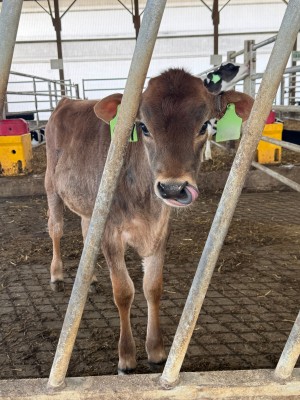Takeaways from the Statewide Transition Heifer Calf Program
Katie Callero, Dairy Management Specialist
Southwest New York Dairy, Livestock and Field Crops Program

During the month of March, I collaborated with Pro-Dairy and the other regional dairy management specialists to host a statewide transition heifer calf program. We had 5 different locations, one of which I hosted in our southwest New York region. We chose to focus on transition calves for this program due to the current dairy replacement heifer inventory being the lowest it has been since 1978 according to the recent USDA Cattle Inventory report. Heifer calves can often get forgotten in the busy swing of things on the farm. We wanted to dedicate time to focus on best management practices since these heifers are farmer's future herd and well worth the management investment. That being said, I wanted to share some of my top takeaways from our workshop for those who were unable to attend.
Inventory
- Figure out how many heifers you are producing annually and how many you need annually. If you need help calculating this number, there are online calculators or feel free to reach out to me.
- When you have more heifers than you need or can raise in your facility, think critically about which animals to cull. Our top recommendations for animals to cull first are ones experiencing disease, recovered from an injury, had a difficult calving, and heifer twins.
Housing
- Bedded pack space should be greater than or equal to 40 square feet per heifer.
- Clean and dry bedding is important! Kneel on the bedding for 15 seconds, your pants should not get damp from the bedding.
Nutrition
- Calves should be eating 4 pounds a day for three days before they are moved out of their individual hutch.
- Water is incredibly important. 3 quarts of water should be drunk for every pound of grain consumed. So, at 4 pounds of grain that would be 3 gallons of water minimum that the calf needs to be consuming.
Health
- Necropsy of dead calves is a useful diagnostic tool to understand the cause of death and prevent it from occurring again in other calves.
- Using an ultrasound on the calf's lungs at the time of weaning is a useful way to find calves with chronic lung damage and make better culling choices.
While there are many more recommendations I could share from this program, I hope these few tips help you start thinking more critically about your transition heifer calves. With inventory of heifers being low, it is crucial you raise the ones you do have to the best of your ability to maximize their potential in your herd.
Upcoming Events
Crops, Cows & Critters - Southwest New York Dairy, Livestock & Field Crops Newsletter Sponsorship
December 19, 2025
Our two forms of publications feature research-based and timely information from our four specialists, listed to the right, along with local event notifications and Cornell University outreach. This information is provided to participants who range from dairy, livestock, and field crops producers to agricultural suppliers and consultants.
Weekly Email Update: Shared with 625+ households who have signed up with our program.
Monthly Paper Mailer: To reach our stakeholders and farmers who lack internet access, we send out a monthly mailer where your company's logo and contact information would be featured with a mailing list of 330+ households.
If you sponsor our weekly and monthly publications you reach approximately 955 households.
Visit our website to view our newsletters!
2025 Cornell Food Beverage & Animal Feed Manufacturer Survey
December 19, 2025
Industry and Educational Advocates for New York State's Food, Beverage, and Animal Feed Manufacturing industries:
As you know, NYS has a diverse food and beverage manufacturing industry, in both the types of industries that exist and the wide distribution of firms by scale. Many manufacturing firms have strong backward linkages to agricultural production sectors in the state that support both farm-level and downstream food industry firms and consumers. In collaboration with the New York State Department of Agriculture and Markets, a team from Cornell University's Charles H. Dyson School of Applied Economics and Management has recently rolled out the 2025 New York State Food, Beverage, and Animal Feed Manufacturer Survey. The industry will benefit from an updated assessment of the industry that informs private and public investments and opportunities to support firm growth and improved profitability.
Cornell Organic Field Crops & Dairy Conference
March 6, 2026
Waterloo, NY
Farmers, researchers, educators, and agricultural service providers from across the Northeast are invited to the 2026 Cornell Organic Field Crops & Dairy Conference, held Friday, March 6, 2026, from 8:00 a.m. to 4:30 p.m. at the Lux Hotel & Conference Center in Waterloo, N.Y.
Co-hosted by New York Soil Health and Cornell CALS, the annual conference brings together leaders in organic grain, dairy, and livestock systems to share practical tools, new research, and farmer-tested strategies to support resilient and profitable organic production.
Announcements
No announcements at this time.





